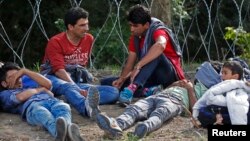The men looked tired and despondent. Their lips were dry after three days of walking and running without food and water.
“We crossed the fence from behind, about 50 kilometers behind. It was a jungle with tall trees,” Tashreefullah Shinwari said, pointing.
He did not know exactly where he and his five friends from a village in Afghanistan had illegally crossed the border into Hungary. All he knew was that it was very difficult.
“Not one, or two, or three, there were more than 20 police cars,” he said.
Almost 10 kilometers inside Hungary’s border, in a place called Asottholom, they did not know where they were or where to go next.
“We’re looking for a police station,” he said. “We’re tired and hungry and want to turn ourselves in.”
This group of desperate young men did not want to cross the border illegally, but did so anyway because of confusion and a lack of credible information.
Similar stories
The same story was true for many other migrants, mostly from Syria and Afghanistan, who walked next to the 4-meter-tall Hungarian border fence on the Serbian side Tuesday.
Many said they wanted to apply for asylum in Hungary but did not know where to go. They had walked from the Serbian side up to the border to find the big fence and were now looking for an entry point.
The Hungarian government started cracking down on illegal border crossings Tuesday. All of the previously open, unofficial border crossings and gaps in the fence were sealed Monday.
A makeshift UNHCR camp in the Hungarian village of Asottholom, which previously served as a temporary holding point for any migrants found in the area, was empty Tuesday. A few policemen were getting ready to clear it out.
At least one police car from the Netherlands was spotted inside Hungary. Its occupants confirmed to VOA that they were helping the Hungarian police with keeping illegal migrants out of the Schengen free-travel zone.
One of the official crossings between Röszke in Hungary and Horgoš in Serbia was blocked from the Hungarian side for normal traffic or even media. Police in large numbers could be seen in the distance manning the border.
Riot police manned the other crossing near the main M5 highway as migrants gathered on the other side.
György Bakondi, chief adviser to Hungarian Prime Minister Viktor Orbán, said Tuesday that migrants coming through Serbia could submit asylum applications at two transit zones: in Röszke and Tompa.
Babar Baloch, UNHCR spokesman for Central Europe, said his organization had received information about registration stopping and resuming throughout the day and were trying to seek clarity.
The Hungarian government has promised a swift review of the applications. Those denied will be sent back to Serbia.
Migrants confused
But hundreds of migrants, gathered on the Serbian side of the Röszke border, appeared unclear as to what was going on. At one point Tuesday, they chanted “no food, no water,” and “Germany, Germany” as they tried to make sense of the situation.
The Hungarian police reacted to at least 60 illegal border crossings Tuesday. Criminal proceedings have been launched against at least 45 people for cutting or damaging the fence to cross illegally.
Meanwhile, Shinwari and his Afghan friends, tired of the uncertainty and in desperate need of food and water, flagged a police car passing by. The officer made them sit with their hands behind their heads at the corner of the road. They were probably going to be deported back to Serbia.




